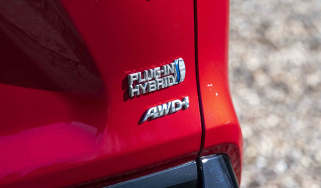Car warranties: guide to new and used car warranties
We explain all there is to know about new and used car warranties, from who offers the best cover to how to claim

Today’s cars are more reliable than ever before, yet it’s still important to consider a car’s warranty when deciding which model to buy. A warranty provides cover in case something goes wrong with the car unexpectedly, providing peace of mind and protecting you from any unplanned bills.
As cars have grown more complex, the importance of a warranty can’t be overstated. Modern technologies like hybrid systems and dual-clutch gearboxes are generally reliable and can run for upwards of 100,000 miles without a hitch, but they can be very costly to repair if something does go wrong. The same goes for the batteries in electric cars – they’re designed to last, but they can be phenomenally expensive to replace.
If you're buying a second-hand car, many dealers will offer a used car warranty, so you know you won't be on the hook for any costly repairs should something go wrong.
The following guide covers everything you need to know about car warranties, from how long they last, to any exclusions, and how you make a warranty claim.
How long does a new car warranty last?
The length of a new car warranty will vary between each manufacturer, but they commonly have a time and mileage limit. The industry standard is three years or 60,000 miles, whichever comes first, but several carmakers offer longer protection than this. With an average annual mileage of 8,000 miles per year, most UK motorists will find the period of cover runs out before the maximum mileage is reached.
In the event you decide to sell your car within the warranty period, many manufacturers allow the warranty to be transferred to the new owner too.
What is the best new car warranty?
While three years, 60,000 miles is common across the industry, there are a few new car warranties that stand out with their more generous cover. These are worth investigating if you tend to cover higher than average mileage, or if you plan to keep your new car for a long time. You can read our full list of the best car warranties here.
- Toyota and Lexus – up to 10 years or 100,000 miles when serviced at a main dealer
- Peugeot – eight years, 100,000 miles for EVs only
- Kia - seven years and 100,000 miles
- XPeng - seven years or 100,000 miles
- Jaecoo - seven years or 100,000 miles
- Omoda - seven years or 100,000 miles
- Suzuki - seven years or 100,000 miles
- MG – seven years or 80,000 miles
- Dacia - seven years or 75,000 miles
- BYD - six years or 93,750 miles
- GWM Ora - five years, unlimited mileage
- Hyundai – five years, unlimited mileage
- KGM (formerly Ssangyong) – five years or 80,000 miles for internal combustion engines (ICE), or seven years or 90,000 miles for EVs
It’s always worth reading the terms and conditions for a particular manufacturer’s warranty, as what’s covered and what’s excluded may differ between brands.
What is an extended car warranty?
Some manufacturers give customers the option to extend their warranty period once the standard cover has expired. The cost of this can vary between manufacturers and we’d suggest getting a quote from one of the many third-party warranty providers, too. However, it’s worth checking the cover of any policy you consider – some third-party policies aren’t as comprehensive as those provided by manufacturers.
What does a car warranty cover?
In most cases, a new car warranty will cover any mechanical and electrical faults that occur outside of the driver’s control. It should also include mention of rust – most warranties will guarantee against the appearance of rust for a minimum of three years. Different brands’ policies vary in some aspects, though: BMW provides a three-year and unlimited-mileage warranty on all its new cars, as well as 12 years’ cover against rust (although corrosion caused by stone chips isn’t covered).
Many hybrid, plug-in hybrid and electric cars have a specific warranty for their battery pack, reassuring buyers that it'll last the life of the warranty cover without severe degradation. For example, on top of Hyundai’s standard five-year, unlimited mileage warranty, it provides eight years or 100,000 miles of cover for the high voltage batteries in its EVs. Some manufacturers will stipulate that if the battery capacity drops below a certain point (70% of its new state, for example) within five years or so, it'll be either repaired or replaced.
What are warranty exclusions?
Car warranties won’t necessarily cover everything. As the owner, you will be expected to replace ‘consumable’ items that naturally wear out through use, such as tyres, brake discs and pads, windscreen wipers and clutches, to name a few. Although, in some cases, cover may be considered if they’ve worn out prematurely as a consequence of a mechanical fault.
Specific items excluded from a manufacturer’s warranty will be stated in the warranty terms and conditions.
What about a used car warranty?
It’s common practice for used car dealerships to provide a warranty as part of the deal with a used car, although they’re rarely as long or comprehensive as a new car warranty. Most dealerships will offer three, six or 12-month warranties, although you may be offered a shorter policy if the car is more than a few years old.
‘Approved used’ cars sold by franchised dealers have usually been given a thorough inspection to spot any issues or defects, and will generally be covered by a 12-month warranty.
Many policies provided with a used car sold at an independent garage will be sourced from a third-party company. It’s very important that you check any warranty policy to confirm what will and won’t be covered under the terms of the policy – some are far more comprehensive than others. You don’t have to buy a warranty, despite what some garages may suggest; you may decide to take the risk and do without the extra expense.
If the used car you’re buying is only a year or two old, it may still be covered by the manufacturer’s original warranty. Check by asking your dealer, or visiting the manufacturer’s website and reading the warranty terms and conditions.
Buying a used car without a warranty
In many cases, especially if the car is older or at the less expensive end of the market, a used car will be offered with no warranty at all. While we generally recommend opting for a car with at least some length of warranty, it may not always be possible. In this scenario, you should be aware of the Consumer Rights Act.
The Consumer Rights Act states that you should expect any car to be of ‘satisfactory quality’, ‘as described’ and ‘fit for purpose’ at the time of sale. If any of these criteria aren’t met, the dealer is under a legal obligation to rectify any faults at their cost. Dealers now have only one opportunity to make repairs. If repairs performed fail to rectify the fault reported, you’re entitled to a refund. It should be noted that you’re likely to find that having repair work performed under the Consumer Rights Act will be a lot easier within the first six months of your purchase being made. If you find a fault, report it to the supplying dealer as soon as possible.
You’ll also need to factor in a car’s age if you’re considering invoking the Consumer Rights Act: an elderly secondhand car costing a few hundred pounds that develops a minor fault (like the glovebox latch sticking, for instance) will likely be deemed of ‘satisfactory quality’ by a dealer, given its value and age.
When buying a used car from a private seller instead of a dealership, the Consumer Rights Act states that the vehicle only has to be ‘as described’. You have very little protection when buying a used car privately, so it’s worth either investigating a third-party warranty or buying from a dealership instead.
Are there different kinds of warranty?
There are three types of car warranty: manufacturer policies, dealer policies and third-party cover. All new cars come with a manufacturer warranty, although you’ll have to go through one of the brand’s dealers if you need to make a claim.
If you’re buying from a franchised dealer, any warranty is likely to be dealer-backed. Smaller dealers often use third-party companies for their warranties and some charge extra if you want to take out a policy. If this is the case, it’s well worth reading through the paperwork carefully and getting a second quote elsewhere, as it may be possible to buy a more comprehensive warranty for less money.
Buying a third-party warranty
There are a number of companies that will sell you a third-party (or ‘aftermarket’) warranty for cars up to about 12 years old – although, do note that older cars that cost more to buy when new and cars with high mileage tend to have higher premiums.
If you find a good aftermarket policy and are happy with the cost, you’ll be reimbursed for any repairs needed for the duration of the warranty. Do bear in mind that third-party warranties tend to have more exclusions than manufacturer warranties; some only cover issues with the engine and gearbox, for example.
It’s also likely you’ll have to get a quote for any repairs, both to officially confirm the fault and to check that the cost of the work falls within the policy’s limits. Make sure to contact the warranty company before getting any quotes, as if the problem isn’t covered by the policy, you’ll have to pay for the diagnostic work yourself.
While some aftermarket warranties are great, many leave much to be desired. Read the policy documents carefully so you’re absolutely clear about what is and isn’t covered. It’s not unheard of for some companies to contest a claim and you’ll want to be doubly sure of what you’re entitled to.
Also note that many third-party policies place a limit on hourly labour rates, which can be fairly low. If this is the case, you’ll have to make up any shortfall yourself or find a cheaper garage. Other providers will only pay a portion of labour and parts costs depending on the age of the car: 80% for a four-year-old car, 60% for a five-year-old car, etc. In essence, read the terms and conditions of any aftermarket policy carefully. We’ve heard of drivers getting great cover and hassle-free repairs, while others haven’t been so lucky.
Vehicle warranty code of practice
When choosing an aftermarket warranty, it’s worth checking if the provider is accredited by the Motor Industry Code of Practice for Vehicle Warranty Products by the Motor Ombudsman. Around 70% of the major providers are fully approved and follow guidelines on advertising their products honestly and giving appropriate advice, clear information on what’s covered by the warranty before you sign, a 14-day cancellation ‘cooling off’ period, and a simple, fair and prompt claims procedure.
How do I make a warranty claim?
Claiming against a manufacturer warranty on a new car should be fairly straightforward and won’t cost you a penny, and many dealerships will also provide a courtesy car while yours is in for repairs.
If you need to make a warranty claim on a used car, this should be a similarly easy process if you bought from a franchised dealer. You might not receive the same level of service as you’d expect with a new car, but it should be a seamless affair and you may be given a courtesy car here as well.
Claiming against a third-party warranty can either be refreshingly simple or frustratingly involved, depending on the quality of the policy. Either way, you’ll most likely have to get the work assessed and quoted for before any repairs are approved; this may add to the time and inconvenience associated with the process, as you’ll potentially have to make two separate bookings with the garage if the claim takes a while to be agreed.
Assuming there are no issues with the work being carried out, some third-party warranty providers will require that you use an approved garage, which they will pay directly. Other policies allow you to use a garage of your choosing, but may require you to pay for the work yourself before reimbursing you. Do bear in mind that – as mentioned above – some policies put a cap on the amount they’ll pay per hour for labour. This is an important area to check before you take out any policy.
Anything else to know?
If you’re thinking of picking up a bargain new car from overseas, be aware that manufacturers sometimes provide different warranties in different countries. On the subject of travel, rest assured that should your car go wrong while on holiday, warranties are valid within the EU – as long as you use an approved repairer. Many manufacturers also include free recovery within Europe as well.
There is one final point to bear in mind: whether you’ve bought a new or a used car, make sure to get it serviced in line with the recommended schedule. Manufacturers and warranty providers are within their rights to reject a claim if you haven’t maintained the car to their stipulated standards. Also remember that warranties don’t cover servicing or MOTs - you’ll still have to pay for these when required.
Frequently Asked Questions
Each new car warranty has pros and cons, but we think Kia’s seven-year, 100,000 mile warranty is currently the best on the market. Toyota and Lexus offer a longer 10-year, 100,000-mile warranty, but this requires the car to be regularly maintained at an approved service centre.
Car buying made simple...
Recommended

Petrol and diesel car ban relaxed with hybrids permitted beyond 2030
Most Popular
Tips & advice

Car dashboard warning lights: what does each symbol mean?

Electric car charging stations: public networks, charger types, apps and maps








